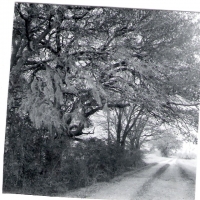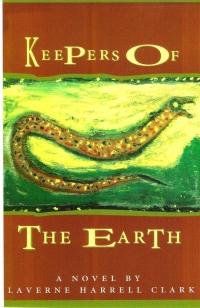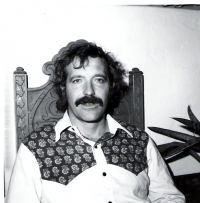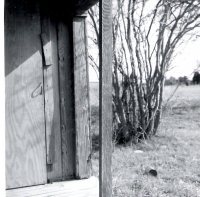Features and Reviews of LaVerne Harrell Clark's novel, KEEPERS OF THE EARTH
Posted Jun 4, 2005
Last Updated Jun 21, 2012
CINCO PUNTOS PRESS of El Paso, TX
Published
LaVerne Harrell Clark's
novel with the assistance of a grant from the National Endowment for the Arts
KEEPERS OF THE EARTH
winner of
1998 Medicine Pipe Bearer's Award
for
Best First Novel
from Western Writers of America
With folkloric and ecological themes, the novel concerns rural families--one white, the other black. Its setting during the mid-sixties in Central Texas bears relationship to the ancestral place Clark inherited near her hometown of Smithville, Texas.
From the publishers'description:
"A haunting story about a Texas family torn between love for their land and oil money. Deep in the Austin chalk, drillers encounter a nest of coachwhip snakes. Neighboring black people know the coachwhips rule the underworld and that disturbing them can cause havoc and death. This is a downhome stew of greed, hoodoo, and white and black folks told as only award-winning folklorist LaVerne
Harrell Clark can tell it."
Keepers of the Earth is part of the Cinco Puntos Press Hell Yes! Texas Women's series $14.95/0-938317-28-8/~At bookstores or call Cinco Puntos Press: (800) 566-9072; www.cincopuntos.com
Quotes from other novelists on the novel's back cover:
"This is a rich brew of a novel, as intricately interwoven as snakes in a den. KEEPERS OF THE EARTH could well become a classic."-Mary Elsie Robertson
"Like a snake charmer, LaVerne Harrell Clark pulls you into KEEPERS OF THE EARTH. With magic, oil wells and a dash of Texas lore, she conjures the Munday family to life right before your eyes."
--Cindy Bonner
The novel was reviewed favorably in many u.s. periodicals, with these significant quotes & notices coming from some of the ones spanning middle America and the internet:
"A gem."-Anne Dingus, TEXAS MONTHLY (June, 1997) with the same issue also spotlighting it in their "hot books" column.
From INDEPENDENT PUBLISHER(Traverse City, MI, 8/98):"A third of the way through, the plot gains momentum like a roller coaster slowly rounding the hightest curve and speeding toward the end of the ride. Characterization is the strongest aspect of this novel. The characters are complex and well-drawn. Their speech is saturated with dialect that brings these people and their region to life and stops short of distracting the reader. The author makes even the most devious characters engaging and treats them all with compassion, making the novel all in all enjoyable."
From INTERNET BOOKWATCH (Oregon, WI., 10, 1997), a review by Shelia Murphy, also appearing in TEXAS REVIEW, FALL/WINTER 98/99 [V.XIX, No.314,105-107):
"In KEEPERS OF THE EARTH, Clark's prowess as a folklorist and her flawless ear for language combine to paint an ingenious sound portrait that richly reveals the struggle of a family and the universal struggle within the human spirit. The characters in Colorado Banks, a fictitious Texas town, are revealed to the reader by way of speech and the choice that each makes. The Munday family and their friends and neighbors are characterized with colorful description and dialogue, helping the reader get to know each indvidual according to the levels of truth that each is able to perceive.
".....Language in Clark's work has served a dual purpose of elucidating true and often hidden motives while revealing humor in the proceedings. In [it], there is a well articulated struggle that serves as the focal point of the growth and development of the characters The novel captures the sense of natural phenomena that is a key controlling feature of the lives [the characters] have come to lead.
"KEEPERS luxuriates in the available time a novel provides, while still maintaining a sense of economy and strong suggestion, to offer a deeper and more complex vision.
"Clark shows an exquisite sense of craftsmanship, wisdom and power in this accurate and satisfying novel that reveals far more than it would claim to show about people's natures and their relative consciousness and conformance to patterns running deep in nature. There is an expert at work here, dazzlingly familiar with the rituals that inform and taunt us with their mysteries."
FROM A VARIETY OF TX'S LEADING LITERARY MAGAZINES AND MAJOR CITY NEWSPAPERS,
COMES THIS HARVEST OF QUOTES:
"Like the concentric circles made by a stone in water, Cefus' magic affects much more than even he could imagine, polarizing cousins and siblings, wives and widows, as well as family friends, in alliances, misunderstandings and bitterness....Clark uses her extensive knowledge of folklore well to weave a story that combines witchcraft and crimminal activity, family dynamics, tragedy and comedy, in the narrow milieu of a Central Texas town where nothing much penetrates the wider world.... characters come to vivid life, and through them a tale of conjuring and its consequences.... it's a very good, sometimes compelling novel."-Jane Tanner, THE DALLAS MORNING NEWS (3/8/98)
"Clark's characters carry the story--their lives and their flaws intertwining like the fiightening coachwhips. In the end it is the land, ravished and abandoned by the fortune-seekers, that endures. 'Keepers' will coil its way into your heart and soul and not let go."
-Judyth Rigler, TEXAS BOOK SHELF, Column appearing in San Antonio Express (3/29/98), FT. WORTH STAR-TELEGRAM (1/11/98). The review was also in twenty other Texas newspapers that carry the column, including ABILENE REPORTER (1/4/98).
"KEEPERS OF THE EARTH is like a gold mine. You have to mine it for its wealth of folklore, for its depection of small town life in the mid-60s, for its paradoxes in characterization and incident, for its depection of the losses sustained as Texas moved from an agricultural to an industrial economy, for its reminders that all creatures are keepers of the earth and that devastation is satanic. Above all, we can trace the ingenuity with which Clark keeps her readers well within the boundaries of actual experience, while plunging them anxiously into the supernatural world of Cefus. It is an admirable feat."-Ernestine Sewell Link, TEXAS BOOKS IN REVIEW (Fall 1997)
"Clark's novel proceeds briskly, on a high-octane formula....It exposes the disillusioning truth behind our common land mythology: that the family roots beneath this ancestral land are really quite shallow....From all the....small talk, a little medicine for the earth: perspective from sentimentality."-Pat Littledog, TEXAS OBSERVER (8/28/98, pp.24-25)
WITH CLARK'S ABILITY WITH FICTION AGAIN GARNERING MEMORABLE QUOTES LIKE THESE FROM THE GREATER SOUTHWEST:
"LaVerne Harrell Clark's KEEPERS OF THE EARTH draws you into a lost world of central Texas hoodoo and regional colloquialisms, rampant with cousin-love, family feuds and oil greed. Clark keeps up a driving pace in this full-to-bursting novel of mysterious connections between an underworld ruled by a nest of coachwhip snakes and a family that's moved into town away from their land--and each other." Charlotte Lowe, TUCSON WEEKLY (11/13-19,'97,p. 29)
"The storytelling is compelling, fearful, sometime hilarious as these so human characters scheme and manipulate. The dialect is masterful. LaVerne captures the regional patois and it becomes bedrock for the story."-Patricia
Anaya, BLUE MESA REVIEW (#19,'98, pp. 314-16.)
NOT TO MENTION THIS LISTING OF OTHER MEMORABLE PASSAGES FROM A SELECTION OF RESPECTED BOOK PAGES REACHING ACROSS ALL THE SOUTHWEST:
BOOKS OF THE SOUTHWEST(SPRG '99,v.43.1,#469, p.11), BOOK TALK, (10/'98,p.15),EL PASO TIMES (12/14/'97), CONCHO RIVER REVIEW(V.12,#1,p.49), TACWT NEWSLETTER ('97,#70,p.22),TX BOOKS IN REVIEW (Lamar U., '98,p.2),ARIZONA DAILY STAR,TUCSON CATALINA FOOTHILLS Sec. of Oro Valley NEWS, Az.,6B (11/26/97)& THE DESERT LEAF(Tucson)(3/'98,p.75.)
Plus an assortment of reviews appearing from east to west, too, in the variety of cross-country literary journals and newspapers listed here: MIDWEST BOOK REVIEW (10/98), ACM (ANOTHER CHICAGO MAGAZINE)(35,'99), PEMBROKE, WOMEN & LANGUAGE (Sprg,' 99, p.59), FOREWORD NEWS(MI.,8,'98, p.15), CHIRON REVIEW {Winter,'98, p.46) HARD ROW TO HOE (Fall,'97,V.III,#15), ROUNDUP, THE PILOT, Southern Pines, N.C.(7/27/98)and JOURNAL OF THE D.H.LAWRENCE SOCIETY,(England,'99,p.179).
-----------------------------------------
Feature Story (Clark's Home Town of Smithville, is 42 miles from Austin,TX)
From THE AUSTIN-AMERICAN STATESMAN (4/10/1998, Sec.F, p.2)
Headline: Smithville's history led writer to first novel
BY ANNE MORRIS, American-Statesman Staff
Coachwhip snakes, chinaberry trees, crape myrtle bushes, wisteria vines. LaVerne Harrell Clark grew up in Smithville with that rich world around her. She recreates it in her award-winning first novel,"Keepers of the Earth." More important, she shows us something harder, to see - the authentic folklore of the place.
Clark, who is older than many first novelists, received her MFA in writing at the University of Arizona and now [1998]lives in Tucson. But she?s been back at the Smithville home place the past couple of weeks, using it as a base for her spring book tour. As part of it, she will sign books from 11 a.m. to 2 p.m. Saturday at the Old Main Bookstore in Bastrop.
By phone from Smithville, she talked about her long-time fascination with folklore. Much of the material in the novel dates to a project she undertook as a 17-year-old student at Texas Woman's University. "I was a journalism major, but one of my favorite teachers, Dr.Eleanor James, taught folklore, and she assigned me to doing a collecting project."
Clark collected stories, cures and remedies from the African Americans who worked for her grandparents. They were people like Mrs. Miranda Griffin, called "Aunt Randy," the aged midwife who worked into her 90s and delivered both LaVerne and her mother. Through the years, others from nearby Bunte Town had continued to pass on their knowledge of the lore to Clark through her mother.
"People practiced conjure during slavery, as a protection against the people over them, and continued to use it for a long time afterwards," Clark said. "The practice of conjuring started to dwindle in the 1950s. World War II changed things."
She set her novel, "Keepers of the Earth" in the 1960s in the fictional Central Texas town of Colorado
Banks. Her character Cefus - one of the last of his kind - had learned hoodoo and conjuring as a disciple to Daddy Gee, who had learned it from his granddaddy, who was brought as a slave to Louisiana from the West Coast of Africa. The book is filled with instances of Cefus's using his powers to fend off evil. (For example, Cefus creates a "luck ball" using the tip of a coachwhip's tail, thread and tinfoil to save his nephew from harm.)
The plot revolves around drilling for oil in Central Texas and the greed activated by the possibility of sudden riches. Families divide, nature threatens, and trouble follows. Clark has illustrated each of the 28 chapters with old photographs she made during the '60s in the towns and countryside around Smithville, Bastrop County and La Grange. It's a novel, but it's very much rooted in reality."
"I had given lectures before on why I'd never write a novel," said Clark, whose six earlier books include short stories, editions of poems and biographies, as well as folklore. "But this time the form chose me." She worked on the book off and on for 10 years. It began as short stories, but grew and changed. "Then, suddenly, here comes Cefus and he wants to take over the book. . . . Whenever a character takes over, I've learned to just follow."
Clark expects ultimately to follow Cefus back to Smithville. "We own this place here, and we'll probably start spending the biggest part of our time here," she said.
"Keepers of the Earth," published by Cinco Puntos Press, won the Medicine Pipe Bearer's Award for Best First Novel from the Western Writers of America. The award will be presented at their annual convention in Colorado Springs on June 25. Another of her books, "They Sang for Horses," about Navajos and Apaches from the Southwest, will be reprinted this year by the University Press of Colorado. When first published in 1966, it won the University of Chicago Folklore Prize.
Published
LaVerne Harrell Clark's
novel with the assistance of a grant from the National Endowment for the Arts
KEEPERS OF THE EARTH
winner of
1998 Medicine Pipe Bearer's Award
for
Best First Novel
from Western Writers of America
With folkloric and ecological themes, the novel concerns rural families--one white, the other black. Its setting during the mid-sixties in Central Texas bears relationship to the ancestral place Clark inherited near her hometown of Smithville, Texas.
From the publishers'description:
"A haunting story about a Texas family torn between love for their land and oil money. Deep in the Austin chalk, drillers encounter a nest of coachwhip snakes. Neighboring black people know the coachwhips rule the underworld and that disturbing them can cause havoc and death. This is a downhome stew of greed, hoodoo, and white and black folks told as only award-winning folklorist LaVerne
Harrell Clark can tell it."
Keepers of the Earth is part of the Cinco Puntos Press Hell Yes! Texas Women's series $14.95/0-938317-28-8/~At bookstores or call Cinco Puntos Press: (800) 566-9072; www.cincopuntos.com
Quotes from other novelists on the novel's back cover:
"This is a rich brew of a novel, as intricately interwoven as snakes in a den. KEEPERS OF THE EARTH could well become a classic."-Mary Elsie Robertson
"Like a snake charmer, LaVerne Harrell Clark pulls you into KEEPERS OF THE EARTH. With magic, oil wells and a dash of Texas lore, she conjures the Munday family to life right before your eyes."
--Cindy Bonner
The novel was reviewed favorably in many u.s. periodicals, with these significant quotes & notices coming from some of the ones spanning middle America and the internet:
"A gem."-Anne Dingus, TEXAS MONTHLY (June, 1997) with the same issue also spotlighting it in their "hot books" column.
From INDEPENDENT PUBLISHER(Traverse City, MI, 8/98):"A third of the way through, the plot gains momentum like a roller coaster slowly rounding the hightest curve and speeding toward the end of the ride. Characterization is the strongest aspect of this novel. The characters are complex and well-drawn. Their speech is saturated with dialect that brings these people and their region to life and stops short of distracting the reader. The author makes even the most devious characters engaging and treats them all with compassion, making the novel all in all enjoyable."
From INTERNET BOOKWATCH (Oregon, WI., 10, 1997), a review by Shelia Murphy, also appearing in TEXAS REVIEW, FALL/WINTER 98/99 [V.XIX, No.314,105-107):
"In KEEPERS OF THE EARTH, Clark's prowess as a folklorist and her flawless ear for language combine to paint an ingenious sound portrait that richly reveals the struggle of a family and the universal struggle within the human spirit. The characters in Colorado Banks, a fictitious Texas town, are revealed to the reader by way of speech and the choice that each makes. The Munday family and their friends and neighbors are characterized with colorful description and dialogue, helping the reader get to know each indvidual according to the levels of truth that each is able to perceive.
".....Language in Clark's work has served a dual purpose of elucidating true and often hidden motives while revealing humor in the proceedings. In [it], there is a well articulated struggle that serves as the focal point of the growth and development of the characters The novel captures the sense of natural phenomena that is a key controlling feature of the lives [the characters] have come to lead.
"KEEPERS luxuriates in the available time a novel provides, while still maintaining a sense of economy and strong suggestion, to offer a deeper and more complex vision.
"Clark shows an exquisite sense of craftsmanship, wisdom and power in this accurate and satisfying novel that reveals far more than it would claim to show about people's natures and their relative consciousness and conformance to patterns running deep in nature. There is an expert at work here, dazzlingly familiar with the rituals that inform and taunt us with their mysteries."
FROM A VARIETY OF TX'S LEADING LITERARY MAGAZINES AND MAJOR CITY NEWSPAPERS,
COMES THIS HARVEST OF QUOTES:
"Like the concentric circles made by a stone in water, Cefus' magic affects much more than even he could imagine, polarizing cousins and siblings, wives and widows, as well as family friends, in alliances, misunderstandings and bitterness....Clark uses her extensive knowledge of folklore well to weave a story that combines witchcraft and crimminal activity, family dynamics, tragedy and comedy, in the narrow milieu of a Central Texas town where nothing much penetrates the wider world.... characters come to vivid life, and through them a tale of conjuring and its consequences.... it's a very good, sometimes compelling novel."-Jane Tanner, THE DALLAS MORNING NEWS (3/8/98)
"Clark's characters carry the story--their lives and their flaws intertwining like the fiightening coachwhips. In the end it is the land, ravished and abandoned by the fortune-seekers, that endures. 'Keepers' will coil its way into your heart and soul and not let go."
-Judyth Rigler, TEXAS BOOK SHELF, Column appearing in San Antonio Express (3/29/98), FT. WORTH STAR-TELEGRAM (1/11/98). The review was also in twenty other Texas newspapers that carry the column, including ABILENE REPORTER (1/4/98).
"KEEPERS OF THE EARTH is like a gold mine. You have to mine it for its wealth of folklore, for its depection of small town life in the mid-60s, for its paradoxes in characterization and incident, for its depection of the losses sustained as Texas moved from an agricultural to an industrial economy, for its reminders that all creatures are keepers of the earth and that devastation is satanic. Above all, we can trace the ingenuity with which Clark keeps her readers well within the boundaries of actual experience, while plunging them anxiously into the supernatural world of Cefus. It is an admirable feat."-Ernestine Sewell Link, TEXAS BOOKS IN REVIEW (Fall 1997)
"Clark's novel proceeds briskly, on a high-octane formula....It exposes the disillusioning truth behind our common land mythology: that the family roots beneath this ancestral land are really quite shallow....From all the....small talk, a little medicine for the earth: perspective from sentimentality."-Pat Littledog, TEXAS OBSERVER (8/28/98, pp.24-25)
WITH CLARK'S ABILITY WITH FICTION AGAIN GARNERING MEMORABLE QUOTES LIKE THESE FROM THE GREATER SOUTHWEST:
"LaVerne Harrell Clark's KEEPERS OF THE EARTH draws you into a lost world of central Texas hoodoo and regional colloquialisms, rampant with cousin-love, family feuds and oil greed. Clark keeps up a driving pace in this full-to-bursting novel of mysterious connections between an underworld ruled by a nest of coachwhip snakes and a family that's moved into town away from their land--and each other." Charlotte Lowe, TUCSON WEEKLY (11/13-19,'97,p. 29)
"The storytelling is compelling, fearful, sometime hilarious as these so human characters scheme and manipulate. The dialect is masterful. LaVerne captures the regional patois and it becomes bedrock for the story."-Patricia
Anaya, BLUE MESA REVIEW (#19,'98, pp. 314-16.)
NOT TO MENTION THIS LISTING OF OTHER MEMORABLE PASSAGES FROM A SELECTION OF RESPECTED BOOK PAGES REACHING ACROSS ALL THE SOUTHWEST:
BOOKS OF THE SOUTHWEST(SPRG '99,v.43.1,#469, p.11), BOOK TALK, (10/'98,p.15),EL PASO TIMES (12/14/'97), CONCHO RIVER REVIEW(V.12,#1,p.49), TACWT NEWSLETTER ('97,#70,p.22),TX BOOKS IN REVIEW (Lamar U., '98,p.2),ARIZONA DAILY STAR,TUCSON CATALINA FOOTHILLS Sec. of Oro Valley NEWS, Az.,6B (11/26/97)& THE DESERT LEAF(Tucson)(3/'98,p.75.)
Plus an assortment of reviews appearing from east to west, too, in the variety of cross-country literary journals and newspapers listed here: MIDWEST BOOK REVIEW (10/98), ACM (ANOTHER CHICAGO MAGAZINE)(35,'99), PEMBROKE, WOMEN & LANGUAGE (Sprg,' 99, p.59), FOREWORD NEWS(MI.,8,'98, p.15), CHIRON REVIEW {Winter,'98, p.46) HARD ROW TO HOE (Fall,'97,V.III,#15), ROUNDUP, THE PILOT, Southern Pines, N.C.(7/27/98)and JOURNAL OF THE D.H.LAWRENCE SOCIETY,(England,'99,p.179).
-----------------------------------------
Feature Story (Clark's Home Town of Smithville, is 42 miles from Austin,TX)
From THE AUSTIN-AMERICAN STATESMAN (4/10/1998, Sec.F, p.2)
Headline: Smithville's history led writer to first novel
BY ANNE MORRIS, American-Statesman Staff
Coachwhip snakes, chinaberry trees, crape myrtle bushes, wisteria vines. LaVerne Harrell Clark grew up in Smithville with that rich world around her. She recreates it in her award-winning first novel,"Keepers of the Earth." More important, she shows us something harder, to see - the authentic folklore of the place.
Clark, who is older than many first novelists, received her MFA in writing at the University of Arizona and now [1998]lives in Tucson. But she?s been back at the Smithville home place the past couple of weeks, using it as a base for her spring book tour. As part of it, she will sign books from 11 a.m. to 2 p.m. Saturday at the Old Main Bookstore in Bastrop.
By phone from Smithville, she talked about her long-time fascination with folklore. Much of the material in the novel dates to a project she undertook as a 17-year-old student at Texas Woman's University. "I was a journalism major, but one of my favorite teachers, Dr.Eleanor James, taught folklore, and she assigned me to doing a collecting project."
Clark collected stories, cures and remedies from the African Americans who worked for her grandparents. They were people like Mrs. Miranda Griffin, called "Aunt Randy," the aged midwife who worked into her 90s and delivered both LaVerne and her mother. Through the years, others from nearby Bunte Town had continued to pass on their knowledge of the lore to Clark through her mother.
"People practiced conjure during slavery, as a protection against the people over them, and continued to use it for a long time afterwards," Clark said. "The practice of conjuring started to dwindle in the 1950s. World War II changed things."
She set her novel, "Keepers of the Earth" in the 1960s in the fictional Central Texas town of Colorado
Banks. Her character Cefus - one of the last of his kind - had learned hoodoo and conjuring as a disciple to Daddy Gee, who had learned it from his granddaddy, who was brought as a slave to Louisiana from the West Coast of Africa. The book is filled with instances of Cefus's using his powers to fend off evil. (For example, Cefus creates a "luck ball" using the tip of a coachwhip's tail, thread and tinfoil to save his nephew from harm.)
The plot revolves around drilling for oil in Central Texas and the greed activated by the possibility of sudden riches. Families divide, nature threatens, and trouble follows. Clark has illustrated each of the 28 chapters with old photographs she made during the '60s in the towns and countryside around Smithville, Bastrop County and La Grange. It's a novel, but it's very much rooted in reality."
"I had given lectures before on why I'd never write a novel," said Clark, whose six earlier books include short stories, editions of poems and biographies, as well as folklore. "But this time the form chose me." She worked on the book off and on for 10 years. It began as short stories, but grew and changed. "Then, suddenly, here comes Cefus and he wants to take over the book. . . . Whenever a character takes over, I've learned to just follow."
Clark expects ultimately to follow Cefus back to Smithville. "We own this place here, and we'll probably start spending the biggest part of our time here," she said.
"Keepers of the Earth," published by Cinco Puntos Press, won the Medicine Pipe Bearer's Award for Best First Novel from the Western Writers of America. The award will be presented at their annual convention in Colorado Springs on June 25. Another of her books, "They Sang for Horses," about Navajos and Apaches from the Southwest, will be reprinted this year by the University Press of Colorado. When first published in 1966, it won the University of Chicago Folklore Prize.



